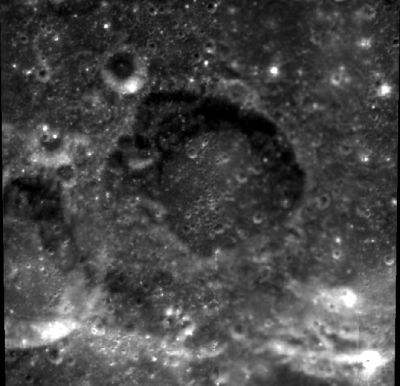Smith
Contents
Smith
(formerly Barringer M)| Lat: 31.6°S, Long: 150.2°W, Diam: 34 km, Depth: km, Rükl: (farside) |

//Clementine//
In the image above, crater Scobee is the central one, with Smith at the frame's left margin (west-southwest of Scobee).
Images
LPOD Photo Gallery Lunar Orbiter Images
Frame 39, made by ZOND 8, shows Smith immediately "above" the grey-white rectangle near the frame's upper right corner. The crater adjacent to Smith (a little bit "above and to the left of it") is Scobee.
Research: Danny Caes
Maps
(LAC zone 105C3) USGS Digital Atlas PDF
Description
Description: Wikipedia
Additional Information
Nomenclature
Michael John; member of the Challenger crew (1945-1986).
- This replacement name for a formerly lettered crater was approved in 1987 (IAU Transactions XXA).
- H.P.Wilkins knew nearside crater Vendelinus C as Smith. C.F.O.Smith (1874-1949) was an English amateur astronomer.
- A small crater south of the nearside's Sculptured Hills (at Apollo 17's Taurus Littrow Valley) seems to have been called Smith (source: APOLLO 17 Preliminary Science Report). Smith (Apollo 17 crater) - "Honoring William Smith (1769-1839) and other natural scientists of the 18th and 19th Centuries who established the fundamental axioms of geology from which we now build our theories on the evolution of the earth and, indeed, of all the planets." (source: APOLLO LUNAR SURFACE JOURNAL, Eric M. Jones).
- It might be interesting to include William 'Strata' Smith aka William Smith IV (1769-1839), English geologist and founder of the science of stratigraphy (mentioned in the book Epic Moon by Sheehan and Dobbins).- DannyCaes Jun 6, 2014
- For those who want to know more about the study of difficult-to-explain apparitions in and outside earth's atmosphere: Wilbert B. Smith and Project Magnet.
LPOD Articles
Bibliography
Many Smiths in the Sourcebook Project (William R. Corliss)
- In Mysterious Universe, a handbook of astronomical anomalies (1979) :
- Smith, Page 371: Does Zodiacal Light Intensity Vary? (D.W.H., Nature, 1973).
- Smith: Page 551: Densities of the Terrestrial Planets (W.H.McCrea, Nature, 1969).
- B. Smith, Page 119: A Review of some ALPO Venus studies (Dale P. Cruikshank, Strolling Astronomer, 1963).
- B. A. Smith, Page 438: Sudden Changes in the Motion of Jupiter's Great Red Spot during 1962 (B.M.Peek, Monthly Notices of the Royal Astronomical Society, 1966).
- C. J. Smith, Page 74: The Blunted Cusp Effect and Terminator Irregularities (Dale P. Cruikshank, Strolling Astronomer, 1963).
- F. E. Smith, Page 693: The Velocity of Light (Raymond T. Birge, Nature, 1934).
- G. H. Smith, Page 90: The Origin of the Cytherean Cusp Caps (C.M.Pither, Journal of the British Astronomical Association, 1963).
- L. G. Smith, Page 605: Lightning, Novae, and Quasars (C.E.R.Bruce, Nature, 1966).
- Scott Smith, Page 439: Correlation between Solar Activity and the Brightness of Jupiter's Great Red Spot (E.R.Graf, Nature, 1968).